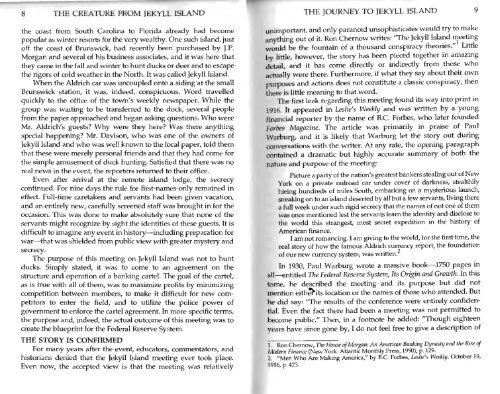You also want an ePaper? Increase the reach of your titles
YUMPU automatically turns print PDFs into web optimized ePapers that Google loves.
8 THE CREATURE FROM JEKYLL ISLAND THE JOURNEY TO JEKYLL ISLAND<br />
the coast from South Carolina to Florida already had become<br />
popular as winter resorts for the very wealthy. One such island, just<br />
off the coast of Brunswick, had recently been purchased by J.P.<br />
Morgan and several of his business associates, and it was here that<br />
they came in the fall and winter to hunt ducks or deer and to escape<br />
the rigors of cold weather in the North. It was called <strong>Jekyll</strong> Island.<br />
When the Aldrich car was uncoupled onto a siding at the small<br />
Brunswick station, it was, indeed, conspicuous. Word travelled<br />
quickly to the office of the town's weekly newspaper. While the<br />
group was waiting to be transferred to the dock, several people<br />
from the paper approached and began asking questions. Who were<br />
Mr. Aldrich's guests? Why were they here? Was there anything<br />
special happening? Mr. Davison, who was one of the owners of<br />
<strong>Jekyll</strong> Island and who was well known to the local paper, told them<br />
that these were merely personal friends and that they had come for<br />
the simple amusement of duck hunting. Satisfied that there was no<br />
real news in the event, the reporters returned to their office.<br />
Even after arrival at the remote island lodge, the secrecy<br />
continued. For nine days the rule for first-names-only remained in<br />
effect. Full-time caretakers and servants had been given vacation,<br />
and an entirely new, carefully screened staff was brought in for the<br />
occasion. This was done to make absolutely sure that none of the<br />
servants might recognize by sight the identities of these guests. It is<br />
difficult to imagine any event in history—including preparation for<br />
war—that was shielded from public view with greater mystery and<br />
secrecy.<br />
The purpose of this meeting on lekyll Island was not to hunt<br />
ducks. Simply stated, it was to come to an agreement on the<br />
structure and operation of a banking cartel. The goal of the cartel,<br />
as is true with all of them, was to maximize profits by minimizing<br />
competition between members, to make it difficult for new competitors<br />
to enter the field, and to utilize the police power of<br />
government to enforce the cartel agreement. In more specific terms,<br />
the purpose and, indeed, the actual outcome of this meeting was to<br />
create the blueprint for the Federal Reserve System.<br />
THE STORY IS CONFIRMED<br />
For many years after the event, educators, commentators, and<br />
historians denied that the <strong>Jekyll</strong> Island meeting ever took place.<br />
Even now, the accepted view is that the meeting was relatively<br />
unimportant, and only paranoid unsophisticates would try to make<br />
anything out of it. Ron Chemow writes: "The <strong>Jekyll</strong> Island meeting<br />
would be the fountain of a thousand conspiracy theories." Little<br />
by little, however, the story has been pieced together in amazing<br />
detail, and it has come directly or indirectly from those who<br />
actually were there. Furthermore, if what they say about their own<br />
purposes and actions does not constitute a classic conspiracy, then<br />
there is little meaning to that word.<br />
The first leak regarding this meeting found its way into print in<br />
1916. It appeared in Leslie's Weekly and was written by a young<br />
financial reporter by the name of B.C. Forbes, who later founded<br />
Forbes Magazine. The article was primarily in praise of Paul<br />
Warburg, and it is likely that Warburg let the story out during<br />
conversations with the writer. At any rate, the opening paragraph<br />
contained a<br />
dramatic but highly accurate summary of both the<br />
nature and purpose of the meeting:<br />
Picture a party of the nation's greatest bankers stealing out of New<br />
York on a<br />
private railroad car under cover of darkness, stealthily<br />
hieing hundreds of miles South, embarking on a mysterious launch,<br />
sneaking on to an island deserted by all but a few servants, living there<br />
a full week under such rigid secrecy that the names of not one of them<br />
was once mentioned lest the servants learn the identity and disclose to<br />
the world this strangest, most secret expedition in the history of<br />
American finance.<br />
I am not romancing. I am giving to the world, for the first time, the<br />
real story of how the famous Aldrich currency report, the foundation<br />
of our new currency system, was written.<br />
In 1930, Paul Warburg wrote a massive book—1750 pages in<br />
all—entitled The Federal Reserve System, Its Origin and Growth. In this<br />
tome, he described the meeting and its purpose but did not<br />
mention either*its location or the names of those who attended. But<br />
he did say: "The results of the conference were entirely confidential.<br />
Even the fact there had been a meeting was not permitted to<br />
become public." Then, in a footnote he added: "Though eighteen<br />
years have since gone by, I do not feel free to give a description of<br />
1 . Ron Chernow, The House of Morgan: An American Banking Dynasty and the Rise of<br />
Modern Finance (New York: Atlantic Monthly Press, 1990), p. 129.<br />
I "Men Who Are Making America/' by B.C. Forbes, Leslies Weekly, October 19,<br />
1916, p. 423.<br />
I


